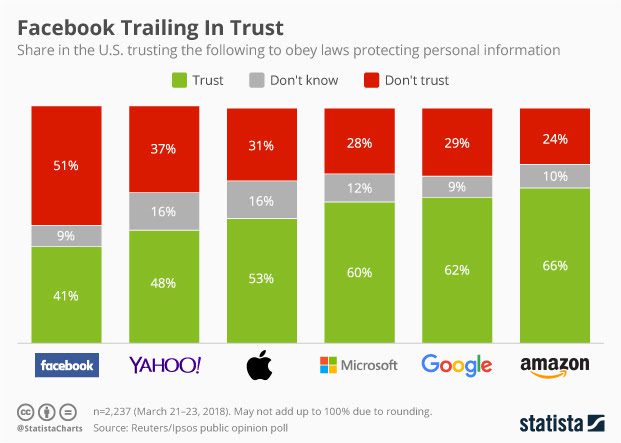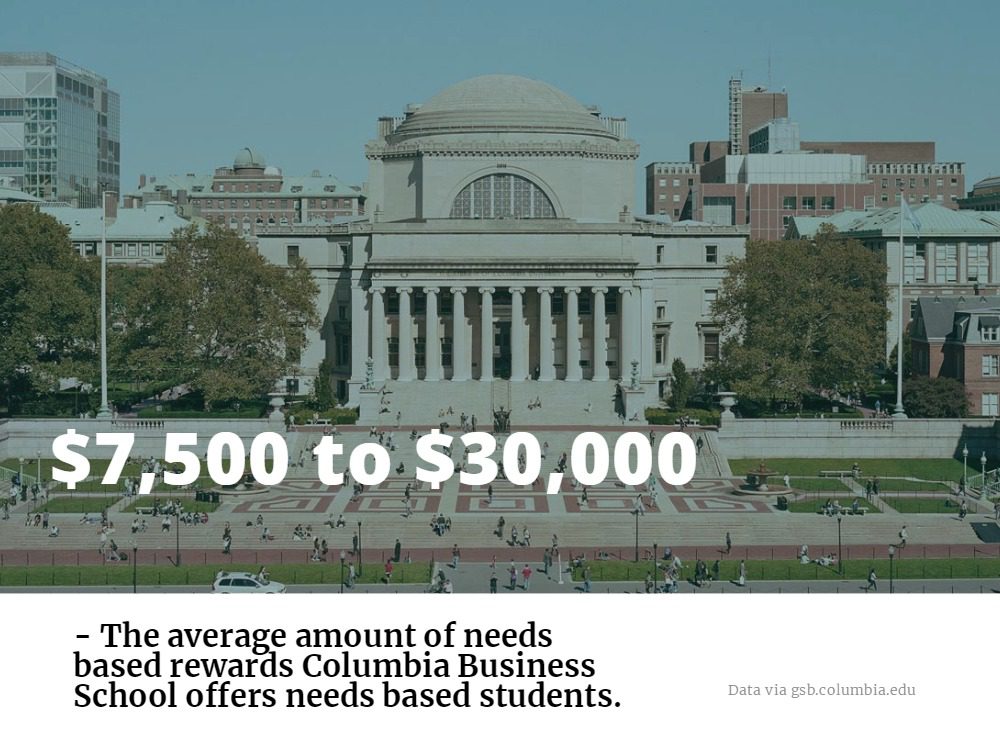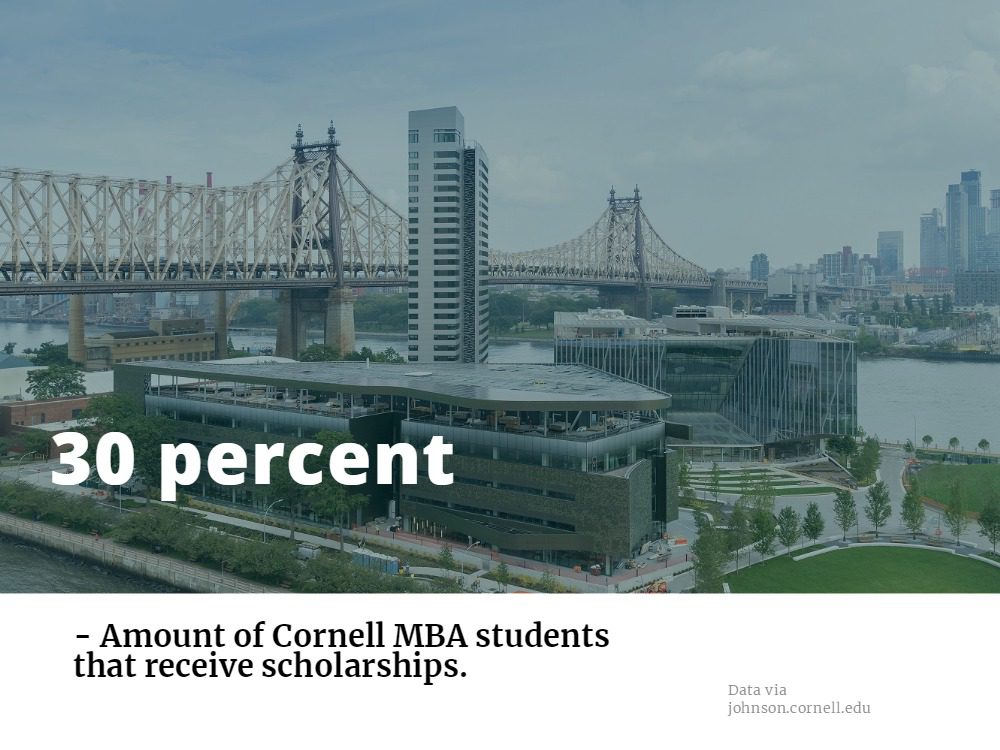What They’re Saying: The Facebook Fallout

It seems puzzling to say a company that is worth nearly half a trillion dollars is venturing somewhere near zero degrees Kelvin, but if you were only reading headlines this week you’d get the sense that Facebook isn’t looking so hot.
Since the break of the Cambridge Analytica scandal, the tech giant lost an estimated $100 billion USD in value, and its beleaguered founder Mark Zuckerberg lost an estimated $14 billion of his own worth. Fortunately for him, according to CNN, he’s still worth over $60 billion so he can easily afford more mayonnaise and butter sandwiches.
But the fallout is more than monetary. Trust in the social media company is at a critical low point, according to Statista data.

Janina Conboye at the Financial Times recently asked how the company may go about repairing its own image in “The MBA view: can Facebook fix its reputation?,” speaking with numerous business school faculty members, including London Business School‘s Jill Schlechtweg, who plainly says, “It is worth wondering whether Facebook can regain credibility at all. Arguably Mark Zuckerberg has evaded responsibility for the social costs of social media addiction, the proliferation of fake news, and now leaks of personal data for political ends.”
Check out how other business schools and industry experts are reacting the ongoing Facebook story below.
What @facebook knows about you apparently includes data about phone calls and messages. The revelation could make Facebook’s huge data scandal hurt more than ever. https://t.co/jActrbEB5i
— MIT Tech Review (@techreview) March 27, 2018
PSA: “Harvard Business School Prof. Shoshana Zuboff calls it “surveillance capitalism.” And as creepy as Facebook is turning out to be, the entire industry is far creepier. It has existed in secret far too long…” https://t.co/vSPlAyWnzu
— Mitchell Schneider (@Mitski) March 27, 2018
What Cambridge Analytica is accused of doing, Facebook and Silicon Valley giants like Google do every day, indeed, every minute we’re logged on. – https://t.co/8O9730vddo
— Mark Schaefer (@markwschaefer) March 29, 2018
In the wake of the Cambridge Analytica scandal, Apple is making their position clear on privacy. https://t.co/OLIl5ihtby
— FOX MBA & MS (@FoxMBA) March 28, 2018
.@profgalloway weighs in on #Facebook‘s handling of the Cambridge Analytica scandal via @barronsonline https://t.co/6zWqfAa3nk
— NYU Stern (@NYUStern) March 28, 2018
The Value of Choosing a Research-Focused MBA Program at UW Foster

How important is faculty research to choosing your MBA program? Should you care if you go to a research university or is it all just white smoke? Is there value in choosing a research-focused MBA program?
We know that faculty matter. According to a paper written by researchers at Indiana University and Michigan State University titled “Faculty Do Matter: The Role of College Faculty in Student Learning and Engagement,” faculty have a significant impact on student learning and the overall educational experience.
“The impact that a faculty member can have on the student experience can be seen in and out of the classroom,” the study explained. “We found that faculty behaviors and attitudes affect students profoundly, which suggests that faculty members may play the single-most important role in student learning.”
But what about faculty research, is it important? Continue reading…
How NYC Business Schools Help the Underprivileged Applicants

Pursuing an MBA is a shrewd move for anyone looking to earn a competitive salary right out of school. Though attending a renowned school can up the price tag of earning an MBA, it may also increase the overall return on investment. According to an article in U.S. News & World Report, “… graduates of top-tier business schools usually earn higher starting salaries than their peers who went to lower-ranked schools.”
It’s not jut the opportunity to have a lucrative job right out of school that makes a high starting salary appealing. An enviable starting salary could mean more earning potential down the line. However, a top-tier school may seem out of reach for low-income applicants. After all, how can you enjoy the return on investment if you can’t afford to invest in the first place?
Luckily, many prestigious business schools offer resources for students from different socioeconomic backgrounds. Below, we’ve outlined the resources available for low-income applicants at five of New York City metro’s best business schools.
How NYC Business Schools Help the Underprivileged
Columbia Business School
Columbia Business School offers need-based awards to many students, which may result in anywhere from $7,500 to $30,000 in tuition support. Nearly half of applicants receive need-based scholarships, which are automatically renewed at the start of the second year. Columbia students can also apply for private and federal loans. To create incentive for students to choose careers in public and nonprofit fields, the school offers a Loan Assistance Program for students who utilize their education to pursue these paths. Students are eligible to apply for this program for up to five years after graduation. Depending on the extent of students’ debt, they may receive anywhere from $2,000 to $10,000 of annual support. Columbia students may also receive merit-based scholarships, such as the Columbia Fellows Program, which may cover full or partial tuition and is granted to applicants with an outstanding track record in leadership and creativity.

Stern School of Business—New York University
NYU’s Stern School of Business offers a variety of scholarships for high-achieving applicants. According to the school’s website, nearly a quarter of students who enter the full-time MBA program receive a merit-based scholarship. There are also additional merit-based opportunities for students coming from different backgrounds and perspectives. Scholarships like the Advancing Women in Business Scholarship and the Forte Fellowship are particularly geared toward female-identifying students, to support women in business. The ROMBA Fellowship aims to help LGBTQ students succeed in business education. The Consortium Fellowship exists to increase the number of minorities such as Hispanic Americans, Native Americans, and African Americans in business school as well.
Gabelli School of Business—Fordham University
At the Fordham University Gabelli School of Business, graduate students may be eligible for federal financial aid, merit scholarships, or a variety of graduate assistantships. Awards based on academic excellence range from $10,000 to full tuition. Exceptional students may be eligible for awards like the Dean’s Premier Scholarship, which includes a $20,000 living stipend, and may include a stipend toward one of Fordham’s global programs. Students can also apply for a plethora of need/merit-based scholarships, like the Hitachi Diversity and Inclusion Scholarship, which seeks to help underrepresented minorities finance their education.
Rutgers Business School, Newark and New Brunswick
The Financial Times ranked Rutgers Business School among the top 50 MBA programs for return on investment in 2017, citing a 130 percent increase in salary for students within three years of completing their degree. Moreover, the school’s website states that, “More than 80 percent of Rutgers students receive some form of financial aid.” Moreover, at $31,011 per year (not including fees), this program is far more affordable than many other prestigious schools. Students can apply for federal or private loans, grants, and an array of scholarships. In addition to the awards offered by the Rutgers Business School Graduate Scholarship Fund, the Rutgers website lists 30 fellowships, scholarships, and partnerships. The Ralph Bunche Fellowships, for example, provide tuition remission, and a $15,000 living stipend to minority students from disadvantaged socioeconomic backgrounds.
SC Johnson Graduate School of Management—Cornell University
Around 30 percent of entering the SC Johnson Graduate School of Management students receive some level of scholarship support. Scholarships like the National Society of Hispanic MBA’s (NSHMBA) and the TOIGO Fellowship specifically seek to help underrepresented minorities. The MD MBA Dual Degree Program and Lee Family Scholarship supports students on the rigorous path to receive their MD/MBA. Additionally, Cornell’s Park Leadership Fellows Program awards full tuition to up to 25 MBA applicants annually. The award is granted based on personal and professional achievements, academic performance, social contributions, and leadership. Students can also apply for federal and private loans.

Georgetown Jumps in Newest Financial Times Global MBA Ranking

Georgetown was one of the bigger winners after the Financial Times unveiled their newest Global MBA Rankings, with the McDonough School of Business earning 16th place in the U.S. and 30th in the world, up from 18th and 40th last year.
To create their rankings, FT evaluated each qualifying MBA program across a wide range of criteria. Much of the data is gathered from alumni and university surveys. According to McDonough, this year’s survey was completed by the class of 2014, which was the first cohort to complete the new school’s new MBA curriculum.
“As a school that prides itself on innovation and excellence, we are pleased to continue climbing in the Financial Times MBA ranking,” said Prashant Malaviya, senior associate dean for MBA programs. “At McDonough, we prepare our students to be principled, global-ready leaders, and we are happy to be recognized by a ranking that values international experiences, career success, and faculty scholarship.”
In addition to alumni data, FT takes the international character and diversity of the school into account for their list. McDonough’s 42-place jump in the International Experience Rank (4th in the U.S.) contributed to high marks in those criteria, as did the required Global Business Experience consulting project and the growing number of international career treks. The school’s faculty research rank is now 19th in the world, up 10 places from last year.
The Financial Times publishes seven rankings annually, relating to MBA, EMBA, Master in Finance, Master in Management programs and Online MBA programs, as well as non-degree executive education courses. They also issue a separate ranking of top European Business Schools. Check out FT’s interactive rankings tables to search for a school of interest, sort by selected criteria and filter by location.
Read more about this year’s FT rankings in our recent spotlight, courtesy of Clear Admit.
Stanford Reigns Supreme on New Financial Times Global Ranking

INSEAD hoped to top the Financial Times MBA rankings for the third year in a row, but it wasn’t to be. The Stanford Graduate School of Business (GSB) gets top bragging rights this year, returning to the number-one spot it has held only once before, in 2012. INSEAD was knocked to number two, followed by the University of Pennsylvania’s Wharton School, which held steady at number three. London Business School (LBS) reclaimed some ground this year—coming in fourth—after a rare fall last year out of the top five. Harvard Business School (HBS), meanwhile, ranked fifth, its lowest showing since 2008.
Rounding out the top 10 this year were the University of Chicago Booth School of Business at sixth (up from ninth last year); Columbia Business School at seventh (unchanged from 2017); China’s CEIBS at eighth (up from 11th); MIT Sloan School of Management at ninth (up from 13th); and UC Berkeley’s Haas School of Business at 10th, (also up from 13th).
Perhaps the greatest victors of this year’s FT rankings were two-year MBA programs, which occupied nine out of the top 10 spots. More two-year programs moved up or maintained their position this year than moved down (31 compared to 21). In contrast, more one-year programs lost ground than gained this year (14 up, 21 down).
“It’s great to see the continued strength of the two-year MBA format in this year’s FT rankings, a format that allows for a truly transformational and immersive experience,” said Clear Admit Co-Founder Graham Richmond. “LBS’s move back into the top five isn’t surprising in light of the program’s continued strength in job placements, new facilities, curriculum redesign, and location at the heart of business and innovation in Europe (even as Brexit looms),” he continued. “While HBS’s position is inconsistent with Clear Admit’s Decision Wire-based data on applicant preferences, it’s the increasing gap in the FT ranking between Stanford and HBS that seems noteworthy.”
As always, the bearing a given ranking should have on your own choice of schools depends on how closely the methodology used to arrive at that ranking aligns with what you deem most important. So just how does the FT compile its list each year?
Understanding the FT Ranking Methodology
The FT ranking is based on surveys of alumni three years out from graduation, school data, and research rank. Alumni responses inform eight criteria—including average income three years after graduation and salary increase compared with pre-MBA salary. Together, these eight criteria account for 59 percent of the overall ranking. School data inform another 11 criteria—including various measures of diversity such as percentages of female and international faculty, students, and board members. Together these criteria make up another 31 percent of the ranking. The remaining 10 percent of the ranking is based on research rank, calculated according to the number of articles by full-time faculty in 50 internationally recognized journals, weighted relative to faculty size.
Record-Breaking Salaries Put Stanford GSB on Top
Stanford, which ranked second last year, managed to unseat INSEAD this year thanks in part to the record-breaking salaries reported by its alumni. The average Stanford alumnus salary three years after graduation was $214,742, up $20,000 over last year’s figures and the highest recorded since the inaugural FT ranking in 1999. Stanford grads’ average salary also represented a 114-percent gain on their pre-MBA salaries, also the highest increase among ranked schools. That a significant proportion of Stanford grads head into highly lucrative hedge fund positions helped it outdistance its rivals in this regard.
Stanford also far outdistanced its U.S. rivals in terms of the international exposure it affords its students. More than 25 percent of the latest graduating cohort did an internship abroad—compared to an average of 4 percent at ranked U.S. schools. Overall, though, Stanford ranked 32nd for international course exposure, down 14 places from last year. But in other measures of diversity, Stanford made gains, including its international faculty (41 percent), international board (25 percent), and international students (41 percent). In this last figure, too, Stanford set itself apart from its U.S. rivals, the majority of which have recruited fewer international students. Although the average proportion for ranked institutions is down by only one percentage point to 38 percent, the FT noted.
Research Scores Hold HBS, LBS Back
Both HBS and LBS saw their average salaries three years out increase by approximately $14,000—to $192,133 and $167,897 respectively. That climb helped LBS return to the top five this year, but sharp drops in each schools’ research ranks worked against them. Harvard’s research rank plummeted from third to 16th—contributing to its fall to fifth in the overall ranking. “This year’s research rank is based on articles published in 50 academic and practitioner journals by full-time faculty since January 2015, but several Harvard faculty last appeared in these publications in 2014, too long ago to count,” the FT noted. LBS, for its part, dropped from 12th to 27th in research rank.
Rice Business, Olin, Georgetown McDonough, Cornell Johnson See Big Gains
Just as two-year MBA programs fared well with regard to their one-year rivals this year, a select group of individual schools saw big gains this year over last. Rice University’s Jones School of Business jumped 19 places this year, from 64th to 45th. This surge can be attributed primarily to strong salary growth. Average salary grew from $130,189 to $139,189, contributing to a 118-percent increase over pre-MBA salary (up from 97 percent last year).
Washington University’s Olin Business School rose 18 spots, from 68th to 50th. The St. Louis school saw significant gains in average salary ($122,709) and increase over pre-MBA salary (107 percent). Georgetown University’s McDonough School of Business jumped 10 spots, from 40th to 30th, thanks also in part to increased average salary, as well as improved research rank (up 10 spots to 17th) and various diversity measures. And Cornell University’s Johnson Graduate School of Management also moved 10 spots up in the ranks, from 27th to 17th, due in great part to a significant increase in its research rank, up 13 places to fourth overall.
Spain’s Schools Slip Out of Top 10
In less celebratory news, two of Spain’s top-tier business schools slid out of the FT’s upper-most ranks. IESE slipped from 10th to 11th. Though its graduates’ average salary increased year over year, the increase was slight. Moreover, it slipped seven spots in terms of percentage increase over pre-MBA salary. Research rank, too, fell by five spots over the previous year.
IE Business School, meanwhile, fell out of the ranking altogether—from eighth last year. This is because it couldn’t gather a representative sample of the school’s alumni to take part in the FT’s survey.
As always, those of us here at Clear Admit encourage prospective applicants to use a school’s performance in these and other rankings as just one of many measurements to determine the MBA program that will best fit your individual needs.
You can view the complete Financial Times 2018 Global MBA Rankings here.
This article has been edited and republished with admissions from our sister site, Clear Admit.
What Are The Most Valuable Toronto MBA Programs?

For prospective MBAs, looking at the price tag of earning a degree can be startling- and may even deter talented business leaders from pursuing an advanced education. The fear is certainly justified: an MBA from some of North America’s top business school can reach upwards of $100,000.
Yet, when considering the well-recorded increase that most professionals witness in their salary after earning an MBA, along with a greater likelihood of finding employment, the seemingly impossible cost of an MBA can seem more within reach.
Factors like the cost of a degree, salary increase after graduation and employment rate of graduates are all key numbers that must be considered together before one can determine the true cost of a degree. Below, we take a glance at these different numbers and round up the Toronto MBA programs that provide the best return on investment.
Ivey Business School – Western University Canada
The Ivey Business School at Western University Canada MBA program began in 1950, and has since established itself as one of the best offerings in the world. The business school’s rich legacy has been recognized again and again by the likes of Bloomberg, which touted its MBA as the 11th best international MBA program in 2017. Ivey, with its main teaching center on Western University’s campus in London, Ontario, offers a variety of MBA experiences, such as an full-time, Accelerated, and Executive MBA. The Tangerine Leadership Centre in Toronto’s downtown business district also offers EMBA courses through the Ivey Business School.
The full-time MBA at Ivey is a 12-month program that costs $88,250 to attend for domestic students and $101,500 USD for international applicants. According to the most recent Ivey employment report, about 91 percent of the 169 students in the Class of 2017 earned a job opportunity shortly after graduation, reporting an average salary of $103,560. More than one-third of the Class of 2017 also earned a singing bonus upon employment with a median value of $15,000. Signing bonuses for Ivey MBA grads ranged as high as $45,000 alone, proving that even with high price tag, the degree can immediately pay off.
Ivey Return on Investment (In USD)
| Ivey MBA Tuition | Median Signing Bonus | Median Annual Salary |
|---|---|---|
| $88,250 | $15,000 | $103,560 |
Schulich School of Business – York University
The Schulich School of Business at York University offers students a number of ways to pursue an advanced business education, from full-time, Executive, and International MBA programs as well as offering Master’s degrees in accounting, finance, business analytics, and more. The Schulich International MBA is the first of its kind in Canada, and the Kellogg-Schulich Executive MBA is North America’s first ever cross-border executive MBA degree. However, length of programs should be taken into consideration, since it will determine the time without a full-time income; an important distinction for students that are looking to enter the workforce as soon as possible. At 16-20 months, an MBA at Schulich will take slightly longer to earn than year-long programs like at Ivey.
Roughly 89 percent of graduates from Schulich’s MBA programs find a job within three months, earning an average base salary of $91,860 USD and an average singing bonus of $12,050. Full-time MBA students at Schulich will pay a tuition of $77,900 during the life of the degree, while part-time students pay $81,000. Meaning, grads typically earn about $10,000 more in their first year of employment than the entire cost of the program.
Schulich Return on Investment (In USD)
| Schulich MBA Tuition | Median Signing Bonus | Median Annual Salary |
|---|---|---|
| $77,900 | $12,050 | $91,860 |
Rotman School of Management – University of Toronto
The Rotman School of Management at the University of Toronto can boast of origins dating all the way back to 1901, when the university first established a diploma program in commerce. By 1972, the School of Business was an official part of the university, and hasn’t stopped growing since. Today, the Rotman School of Management has become universally recognized by the likes of Financial Times the and Bloomberg as one of the best business schools in the country. Located in downtown Toronto, Rotman offers a two-year, full-time MBA degree, but also more flexible options such as part-time morning and evening MBA programs, executive MBA, and an 18-month Global Executive MBA.
The two-year, full-time MBA tuition at Rotman comes with a price tag of $101,350 CAD ($74,999 USD). However, graduates—80 percent of whom typically find employment within three months after earning their degree—saw a median base salary of $85,000 and median signing bonus of $13,500. This salary increase seems to be typical of MBA graduates in Canada, so considerations of employment rate and program duration may be most important when evaluating Return on Investment for top programs in Canada.
Rotman Return on Investment (In USD)
| Rotman MBA Tuition | Median Signing Bonus | Median Annual Salary |
|---|---|---|
| $74,999 | $13,500 | $85,000 |
